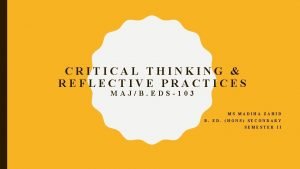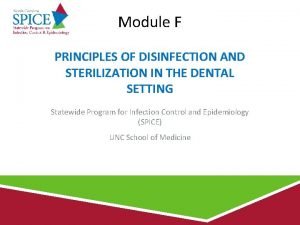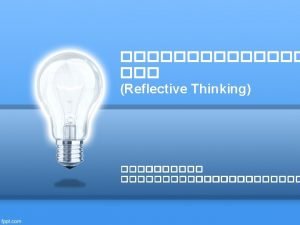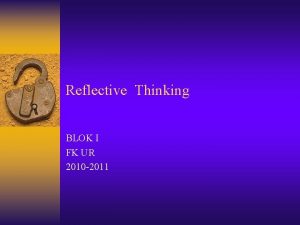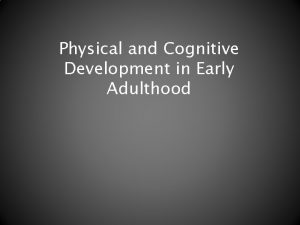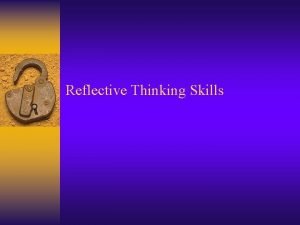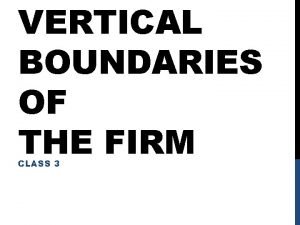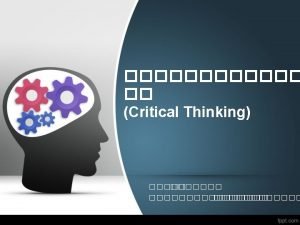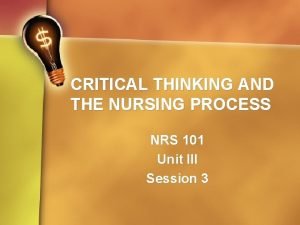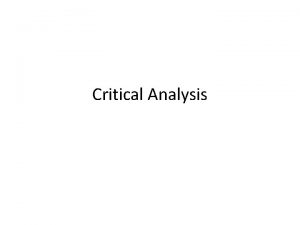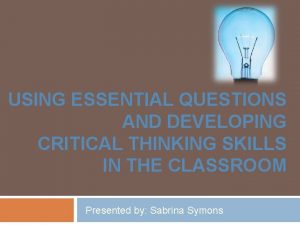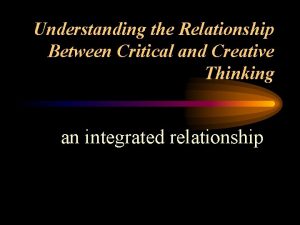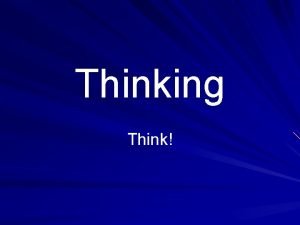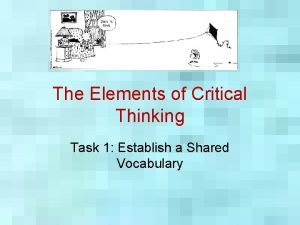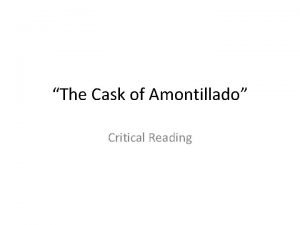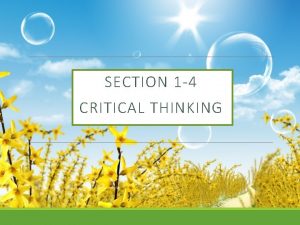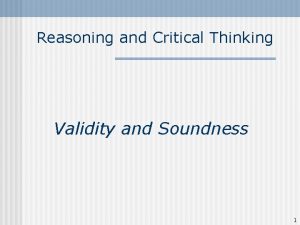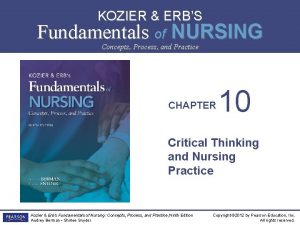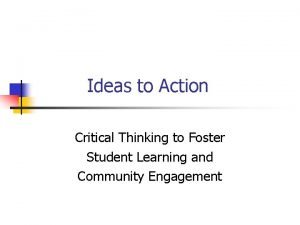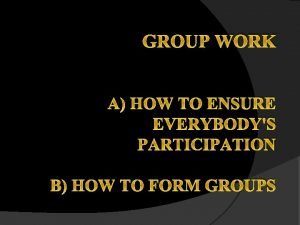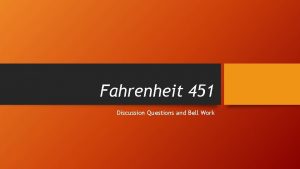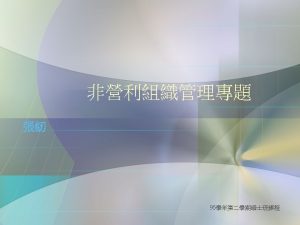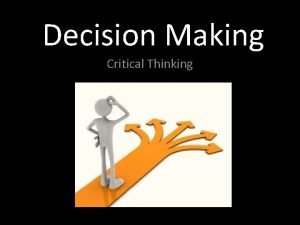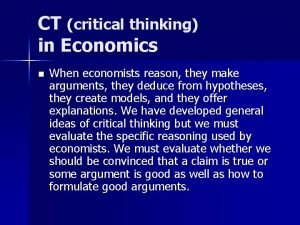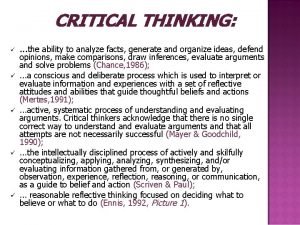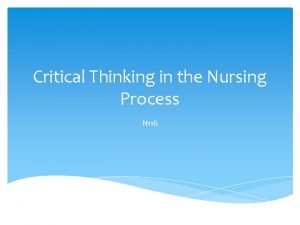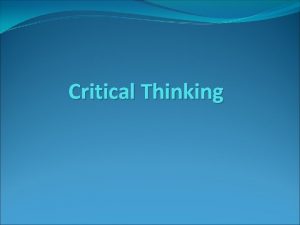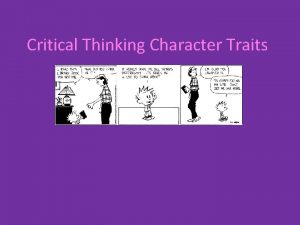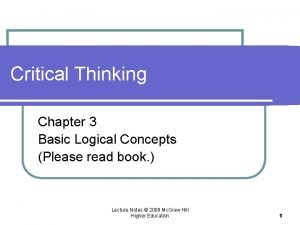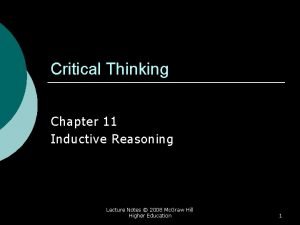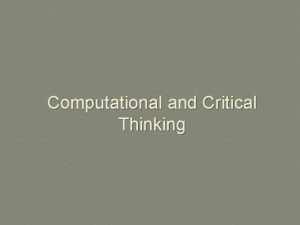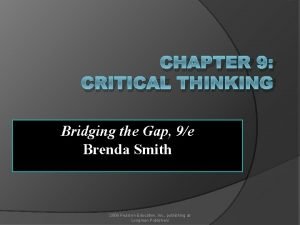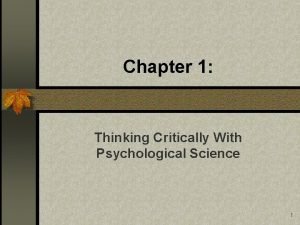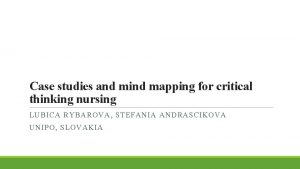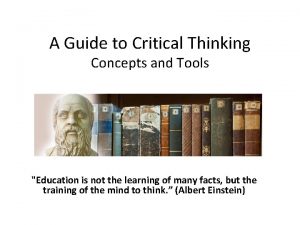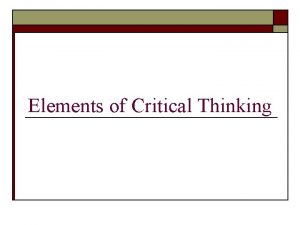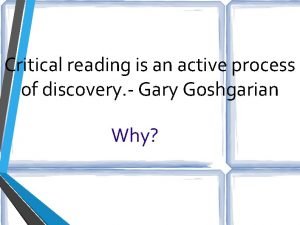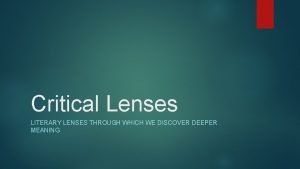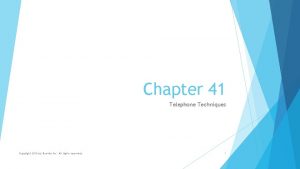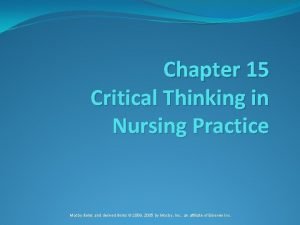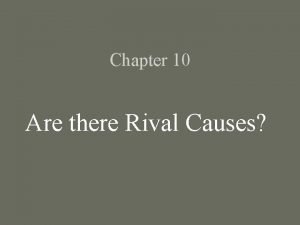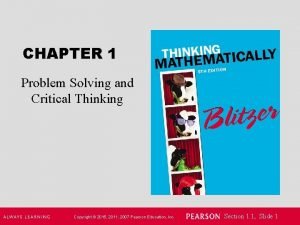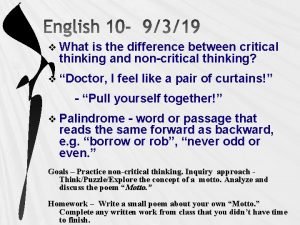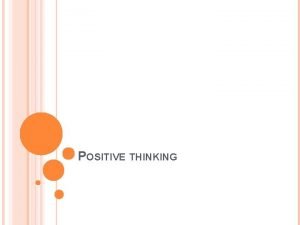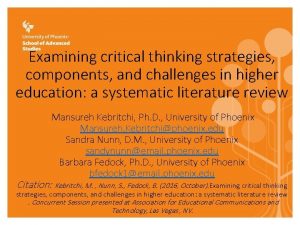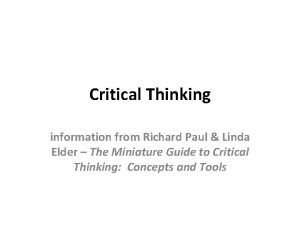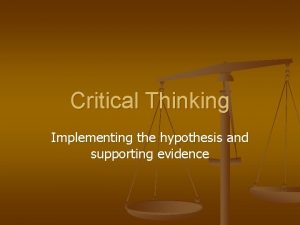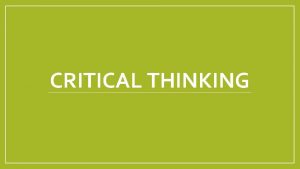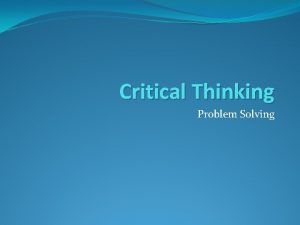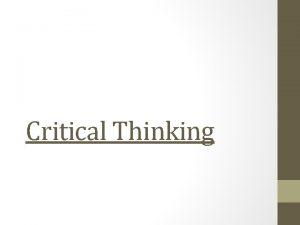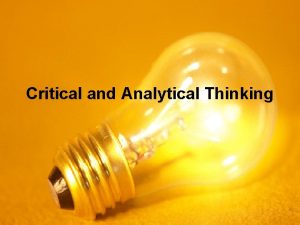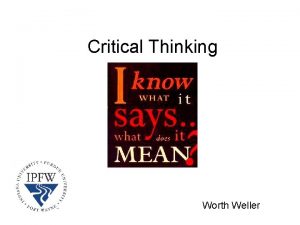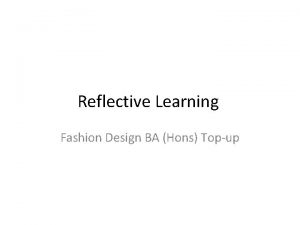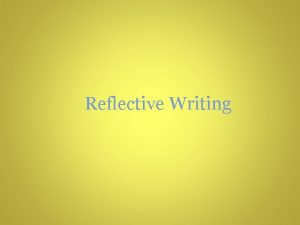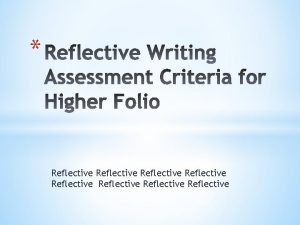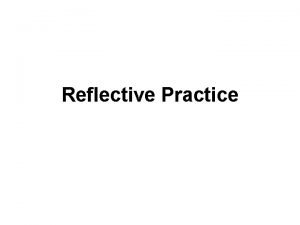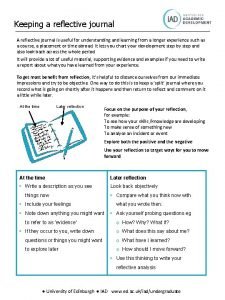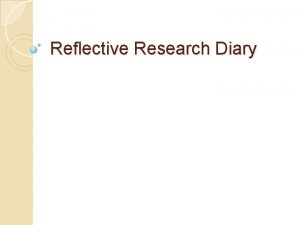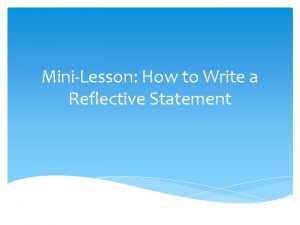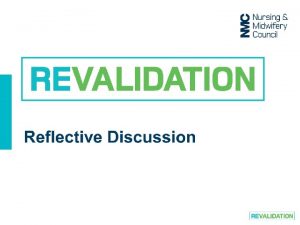Critical Thinking Definition of Critical Thinking Reflective thinking





































































- Slides: 69

Critical Thinking 批判性思考 吳麗珍










Definition of Critical Thinking • Reflective thinking “Active, persistent, and careful consideration of a belief or supposed form of knowledge in the light of the grounds which support it and the further conclusions to which it tends” (John Dewey, 1909, p. 9)


Critical Thinking • Reason and conclusion (推理和結論) • Different patterns of reasoning (不同的推理方式) • Assumption, argument, thinking map (假設, 論點, 思考圖表) • Acceptability of reasons: their credibility (可信度) • Judging the credibility of sources (可信度的來源) • Evaluating inferences (對於推論的評值) • Reasoning about causal explanations (因果關係的推理) • Decision making: opinion, consequences, values and risks

Barriers to Critical Thinking • What are the most common barriers to critical thinking? 批判性思考的障礙

Barriers to Critical Thinking • • lack of relevant background (缺乏相關背景知識) poor reading skills (閱讀技巧不好) bias 偏見 prejudice 偏見, 偏愛 (種族, 性別, 宗教…) narrow-mindedness, close-mindedness self-deception (自我欺騙) superstition (迷信) 如打破鏡子會帶來厄運 懷孕時不能拿剪刀 • overpower emotions (被情緒制伏)

Barriers to Critical Thinking • Egocentrism (自我中心的思考) see reality as centered on oneself-interest thinking self-serving bias • Sociocentrism (group-center thinking) group bias conformism (follow the crowd 從眾) ethnocentrism • Unwarranted assumptions and stereotypes

Barriers to Critical Thinking • • • Wishful thinking (一廂情願) peer pressure (同儕壓力) Stereotype (刻版印象) selective memory (選擇性記憶) selective perception (選擇性知覺)

Three Distinctive Sets of Questions • What are the raw facts? (原始的事實是什麼? ) • What is the most neutral description of the situation? (中立, 不含褒貶的描述) • If one describes the experience this way, and another disagrees, on what description can they agree? (怎樣的描述, 會使對方同意)

Three Distinctive Sets of Questions • What interests, attitudes, desires, or concerns do I bring to the situation? (我的興趣, 態度, 欲望, 關心之處) • Am I always aware of them? Why or why not? (我注意到我的我的興趣, 態度, 欲望, 關心 之處? 為什麼不? )

Three Distinctive Sets of Questions • How am I conceptualizing or interpreting the situation in light of my point of view? (我的觀點怎樣使我構思或解釋情境) • How else might it be interpreted? (別的解讀? 對某一現象, 有其他的解釋? )


Different Patterns of Reasoning • The simplest case One reason, one conclusion <reason> so [conclusion] The damage which has been caused to the ozone layer is an international problem so the problem can only be solved through international agreement.

Different Patterns of Reasoning • Giving ‘side-by-side’ reasons Two reasons for the conclusion <reason 1> and <reason 2> so [conclusion] Three reasons for the conclusion <reason 1> and <reason 2> and <reason 3> so [conclusion]

Different Patterns of Reasoning • A ‘chain’ or ‘serial’ reasoning <reason 1> so [conclusion 1] and [conclusion 2] • Planting genetically modified crops will enable farmers to use more powerful weed-killers (which would have killed the crops if used previously), so there will be a substantial reduction in the number in density of weed seeds on farmland. Thus, it is likely that the many farmland birds which depend on these seeds to survive during the winter will decline still further. • 舉一個護理 作的例子

Different Patterns of Reasoning • Reasons which have to be taken together: ‘joint’ reasons Reasons have to be taken together to give support to the conclusion. • So for all these reasons, we should…

Example of ‘join’ Reasons • Dissecting creatures in the biology classroom teaches students that animal life is expendable and unimportant. Also a recent study showed that certain companies who supply these creatures are careless of the suffering and pain inflicted on them. Furthermore there are good alternatives available now in computer simulations, which tech the lessons taught by dissection just as well. So for all these reasons we should no longer use dissection of animals to tech students in the biology classroom.

Arguments versus Explanations • Explanation --Jane was very angry at John because he had crashed her car. (解釋原因) --to assume the conclusion is true • Arguments (論證) --We should restrict the production of ‘greenhouse’ because they are damaging the ozone layer. --try to prove, to persuade the consequence (conclusion) is true

Inferences 推論 • We commonly infer all sorts of things from other things we know (從一個現象推論到其他現象) • We start from one or more beliefs and move from these beliefs to other beliefs which they take to be justified by the first one. • Scientists commonly infer beliefs from their observations and experiments (從一個研究結果推 論到其他情況, 族群) • We may make inferences very confidently • We may not so confident about what we infer


• Women’s brains are on average smaller than men’s, therefore women are less intelligent than men. • The reason is true, but does not support the conclusion. • There is not a connection between the reason and the conclusion.


Deductive Argument valid sound invalid unsound Inductive Argument strong cogent weak uncogent

Soundness • deductive arguments- the truth of the premises will guarantee the truth of the conclusion IF the premises are all true, THEN the conclusion Must be true. Once it is determined that an argument has a Valid form (it is a Deductive argument), the next step is to determine if all of the premises are indeed true. • inductive arguments - those arguments where the truth of the premises will only make the truth of the conclusion highly probable or likely, but not certain.








Deductive Argument • • • Hypothetical syllogism (假言三段論證) Categorical syllogism (定言三段論證) Argument by elimination (排除論證) Argument based on mathematics Argument from definition

Hypothetical syllogism假言論證 • Syllogism: 2 premises and 1 conclusion • • • modus ponens (affirmative mode) Chain argument Modus tollens (denying the consequent) Denying the antecedent Affirming the consequent


Valid argument forms modus ponens (affirmative mode) • 1. If A then B, 2. A 3. Therefore, B (conclusion) • 1. If A is true, then B is true 2. A is true 3. Therefore, B is true • 1. 假如我們是在台南 (A), 那我們就是在台灣 (B) 2. 我們是在台南 (A) 3. 所以我們就是在台灣 (B)

Modus tollens (denying the consequent) • If A then B Not B Therefore, not A • 1. 假如我們是在台南 (A), 那我們就是在台灣 (B) 2. 我們不是在台灣 (not B) 3. 所以我們就不是在台南 (not A) Valid argument form

Categorical Syllogism • Three-line-argument • Each statement begins with the word “all, ” “some, ” or “no. ” • 所有的老虎都是肉食動物 所有的肉食動物都吃肉 所以所有的老虎都吃肉

Argument by Elimination • An Argument that seeks to rule out various possibilities until only a single possibility remains. • Either Joe committed the murder, or Lynn committed the murder, or Alan committed the murder. If Joe or Lynn committed the murder, the weapon was a rope The weapon was not a rope So, neither Joe or Lynn committed the murder Therefore, Alan committed the murder

Argument from Definition • An argument is “true by definition” • Bill is a cardiologist Therefore he is a doctor. • Beth is a nun It follows that she is a woman

Inductive Argument 歸納法


Inductive Argument • • • Inductive generalization (蓋括, 泛論) Predictive argument (預測) Argument from authority (權威) Causal argument (因果) Statistical argument (統計) Argument from analogy (類比)

Inductive Generalization • An argument in which a generalization is claimed to be probably true on the basis of information about some members of a particular class. • 目前所找到的恐龍的骨頭都是存在有 650, 000年 所以很可能所有恐龍的骨頭都是存在有 650, 000年

Predictive Argument 預測 • An argument in which a prediction is defended with reasons. • 從有氣象記錄以來, 台北五月都下很多雨 所以台北今年五月也很可能下很多雨 • Most US presidents have been tall. Therefore, probably the next US president will be tall.

Argument from Authority • Asserts that a claim is true by citing some presumed authority. • More people die of skin cancer each year than die in car accidents. My doctor told me. • 財經專家說明年的經濟會復甦. • 大英百科全書上說幾百年前就有過人被禽 流感傳染的案例.


Soundness • deductive arguments- the truth of the premises will guarantee the truth of the conclusion IF the premises are all true, THEN the conclusion Must be true. Once it is determined that an argument has a Valid form (it is a Deductive argument), the next step is to determine if all of the premises are indeed true. • inductive arguments - those arguments where the truth of the premises will only make the truth of the conclusion highly probable or likely, but not certain.

Deductive Validity • All deductive arguments are either 100% valid or 100% invalid. • No deductive argument an be “sort of valid” or “most valid. ” It doesn’t come in degrees. • Valid does not mean “true. ” • Valid: the argument is a logically reliable pattern of reasoning, that the conclusion follows necessarily from the premises.

Inductive Strength • Weak inductive argument: the conclusion does not follow probably from the premises. • Because the conclusions of these arguments are not probably true even if we assume that the premises are true. • All previous US presidents have been men. Therefore, it is likely that the next president will be a woman.

Inductive Strength 歸納的強度 • Strong inductive argument: the conclusion follows probably from the premises. • Most college students own CD players. Andy is a college student. So, Andy probably own a CD player.

• And (A and B) • Or (A or B)









 Critical thinking and reflective practices
Critical thinking and reflective practices Critical semi critical and non critical instruments
Critical semi critical and non critical instruments Spaulding classification of medical devices ppt
Spaulding classification of medical devices ppt Perbedaan critical thinking dan creative thinking
Perbedaan critical thinking dan creative thinking Small group communication theories
Small group communication theories Characteristics of reflective thinking
Characteristics of reflective thinking Reflective thinking adalah
Reflective thinking adalah Physical development in adulthood
Physical development in adulthood Reflective thinking
Reflective thinking Reflective journal definition
Reflective journal definition Critical thinking definition
Critical thinking definition Evaluation in nursing process
Evaluation in nursing process Compare non-critical readers with critical readers.
Compare non-critical readers with critical readers. Barriers to critical thinking
Barriers to critical thinking Critical thinking guidelines
Critical thinking guidelines Critical thinking examples
Critical thinking examples Relationship between creative and critical thinking
Relationship between creative and critical thinking Critical thinking in everyday life
Critical thinking in everyday life Elements of critical thinking
Elements of critical thinking Poe is a master at creating an eerie
Poe is a master at creating an eerie Critical thinking examples
Critical thinking examples What is validity in critical thinking
What is validity in critical thinking Active learning strategies to promote critical thinking
Active learning strategies to promote critical thinking Levels of critical thinking in nursing
Levels of critical thinking in nursing 5 components of critical thinking
5 components of critical thinking Critical thinking icebreakers
Critical thinking icebreakers Critical thinking in group work
Critical thinking in group work Fahrenheit 451 discussion questions part 3
Fahrenheit 451 discussion questions part 3 Critical thinking wikipedia
Critical thinking wikipedia Portable heating unit on the moon
Portable heating unit on the moon Example of objective claim
Example of objective claim Critical thinking cheat sheet
Critical thinking cheat sheet Types of nursing diagnoses
Types of nursing diagnoses Conclusion of critical thinking
Conclusion of critical thinking Critical thinking wheel
Critical thinking wheel 5 components of critical thinking
5 components of critical thinking Importance of critical thinking in nursing process
Importance of critical thinking in nursing process How to use critical thinking
How to use critical thinking Objectives of critical thinking
Objectives of critical thinking Intellectual courage in critical thinking
Intellectual courage in critical thinking Intellectual traits of critical thinkers
Intellectual traits of critical thinkers Critical thinking chapter 3
Critical thinking chapter 3 Chapter 11 critical thinking
Chapter 11 critical thinking 5 components of critical thinking
5 components of critical thinking Plus minus interesting example
Plus minus interesting example Chapter 9 critical thinking answers
Chapter 9 critical thinking answers Logic and critical thinking chapter 2
Logic and critical thinking chapter 2 Critical thinking guidelines in psychology
Critical thinking guidelines in psychology Critical thinking mind map
Critical thinking mind map Critical thinking barriers
Critical thinking barriers Critical thinking concepts and tools
Critical thinking concepts and tools The three dimensions of critical thinking
The three dimensions of critical thinking Critical thinking flow chart
Critical thinking flow chart The elements of critical thinking
The elements of critical thinking Critical reading is an active and reactive process
Critical reading is an active and reactive process Critical lenses
Critical lenses Chapter 41 telephone techniques
Chapter 41 telephone techniques Fundamentals of nursing chapter 15 critical thinking
Fundamentals of nursing chapter 15 critical thinking Rival causes explanation
Rival causes explanation Chapter 1 critical thinking
Chapter 1 critical thinking Critical thinking in journalism
Critical thinking in journalism Non critical thinking
Non critical thinking The crucible act 2 socratic seminar questions
The crucible act 2 socratic seminar questions Critical thinking positive and negative
Critical thinking positive and negative Critical and creative thinking victorian curriculum
Critical and creative thinking victorian curriculum Holistic critical thinking
Holistic critical thinking Barriers to critical thinking university of phoenix
Barriers to critical thinking university of phoenix Critical thinking objectives
Critical thinking objectives Richard paul and linda elder
Richard paul and linda elder Hypothesis in critical thinking
Hypothesis in critical thinking
